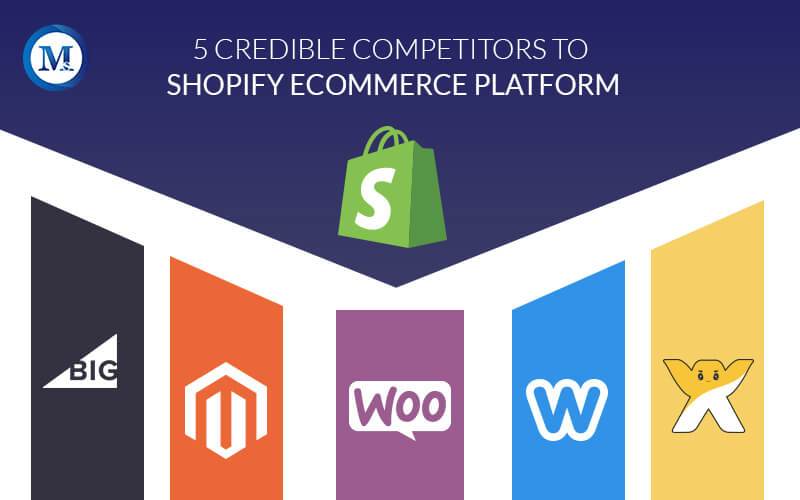
Shopify is a great eCommerce platform, but you cannot be sure of its greatness until you compare it with its competitors or alternatives.
If you wish to present your product on an eCommerce platform, Shopify seems to be the best option, considering its ease of development and the kind of value-added features you can expect with so little expense.
However, until you complete a competitive evaluation of the various available platforms, you cannot be sure which platform suits your purpose best.
There are several similar features that other platforms provide you; in these respects, Shopify doesn’t differ much from others.
However, with respect to many other features and qualities, Shopify is an excellent platform from which to choose. To explain the competition, let us feature the competitors of Shopify and evaluate their pros and cons.
BigCommerce
BigCommerce is a well-known eCommerce platform, like Shopify, that does not require you to be highly technical or experienced in programming. As a platform that provides hosting services, BigCommerce is among the most comprehensive.

The platform allows you to set up your business by uploading the products and adding a payment system quickly than you think. The platform also offers round-the-clock phone, email, and live chat support.
Magento
Magento is also one of the most powerful eCommerce platforms. It can easily be considered a Shopify alternative. Being a free, open-source platform, the community edition is not a “full service” platform like Shopify or BigCommerce.

Though you can avail of Magento Community Edition for free, you need to be quite a programmer or hire Magento developers to put together everything required to work as an eCommerce platform.
You also need to have your hosting services and configure the tools. The most demotivating aspect is the lack of 24/7 customer service to help troubleshoot issues.
On the other hand, there are a few upsides as well.
For example, it is a highly flexible eCommerce builder that seamlessly integrates the features needed for modern eCommerce websites. However, if you do not want to invest in developers and prefer a simple platform to build on yourself, Magento may not be your ideal choice.
WooCommerce
WordPress, the world’s most popular blogging platform, has now developed a feature-rich eCommerce platform. In fact, WooCommerce has powered many eCommerce stores.
If your business website is built with WordPress, you can further avail yourself of the WooCommerce tools and turn them into a feature-rich eCommerce website.

A vast array of Woo Themes working automatically and seamlessly with WordPress.com can allow you to create your eCommerce store’s custom look and feel.
To explain the power of WooCommerce, we can cite many business websites powered by this. WooCommerce now powers more than 29% of all online stores.
The only minus point is that it is a free and open-source platform. So, you cannot get automatic development help from other platforms like BigCommerce or Shopify.
You need to hire a developer with experience working with the platform to build a shopping site with all the required features.
Wix eCommerce
Wix is another easy-to-use drag-and-drop website builder. The big advantage of using Wix is that you can place content anywhere on the website. Plus, you can customize the layout to your liking.
Wix eCommerce is an easy-to-use platform requiring no technical knowledge or programming skills.

Some new features, such as Wix Code and SEO Wiz, will let you create web pages dynamically. It also helps users easily find web pages in search results.
Wix offers a comprehensive range of features, covering everything you need to build a sophisticated eCommerce store.
Weebly
Considering many factors, Weebly is one of the easiest drag-and-drop website builders available today. This platform has fewer tools than Wix, but they are more user-friendly than ever.

Their eCommerce platform is equipped with ready-to-deploy features, making it very easy for non-technical persons. By many measures, there are few features in Weebly that compare to BigCommerce or Shopify.
However, when it comes to intuitive and user-friendly features, Weebly is a strong alternative. Although you do not have the same level of support as paid platforms, its simplicity and user-friendliness make it an ideal tool.
Finally, you must have a few clear considerations to make your choice. For people who have already tested Shopify and found it does not fit them, they can choose any of the alternatives mentioned above.
When using Magento or WooCommerce, you must manage the technical aspects yourself or hire developers with the necessary technical expertise. However, a positive aspect of these platforms is that you can customize them more frequently.
In contrast, Wix and Weebly are primarily drag-and-drop website builders that let you build a website without writing a single line of code. Without the least technical skill or knowledge, you can create these websites.
Based on the comparison above, you need to choose your eCommerce platform based on your priorities, budget, technical skills, customization needs, and other factors.
Magento and WordPress are free, open-source platforms. But building your eCommerce store with them may require more time and resources.
If you have no technical skill but want the simplest way to make your eCommerce website live quickly, then strike out Magento and WordPress from your scheme of things.
From all these considerations, it is clear that you have a few credible competitors from Shopify. Hence, your final choice depends on cost, customization needs, and technical skills.
Read More about Shopify:
- How To Login Shopify Store?
- Shopify Premium Themes & Templates
- What is Shopify Store Setup Pricing?
- What are Shopify Apps?
- What is the Shopify API for the developer?
- How can Shopify Plus Be a Boon to Your Business?
- A Solution to Verify Customer’s Age before Selling Prohibited Products Online
AboutManthan Bhavsar
Related Posts
How Could Shopify Gold Be the Best Enterprise Solution For Indian Entrepreneurs?
Considering the hundreds of high-volume businesses and thousands using Shopify Plus, we can only imagine the high prospects...
8 Best Free Magento 2 Themes ( Updated 2021 )
When it comes to building eCommerce stores, the more visual the design, the better. All online stores must follow this trend...

